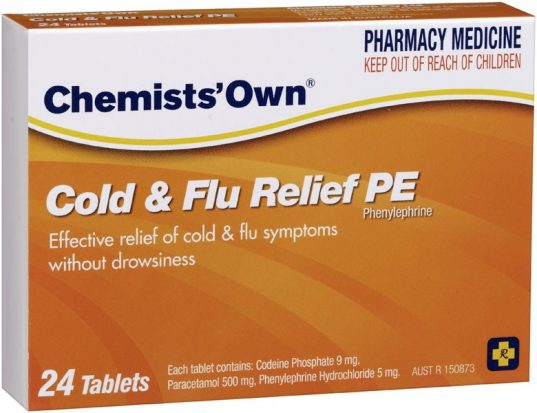 The announcement by the Therapeutic Goods Administration that pharmaceutical products that contain codeine will no longer be available over the counter in 2018 has been met with resistance by the Australian Self Medication Industry and many ordinary Australians who rely on these medications for self-management of pain.
The announcement by the Therapeutic Goods Administration that pharmaceutical products that contain codeine will no longer be available over the counter in 2018 has been met with resistance by the Australian Self Medication Industry and many ordinary Australians who rely on these medications for self-management of pain.
Medications containing codeine will be Schedule 4 drugs from February 2018, meaning that for people to obtain them, they will have to get a prescription from a GP.
The main reason cited is that codeine is unsafe and addictive for certain people and that because of this, there is a potential for abuse. This reasoning is faulty and it assumes that making a substance harder to obtain will somehow prevent people becoming addicted to it. If this were the case, then there wouldn’t be people who are addicted to drugs that are already only available by prescription like Valium or Xanax.
At an addiction clinic run by Dr Christian Rowan in Brisbane, people addicted to over the counter codeine represent 25 per cent of all people treated. 15 per cent are addicted to prescription only medications and 40 per cent are people addicted to illicit drugs which present an even higher hurdle to obtain than prescription drugs. The remaining 20 per cent are alcoholics. That means that the majority (55 per cent) of all the people being treated at the clinic are being treated for addictions to substances that are already restricted by the TGA or are illegal. Clearly, restrictions do not prevent addictions.
Products containing codeine are used successfully by millions of Australians to manage chronic pain conditions, migraine and menstrual pain. Although addiction is unfortunate, the vast majority of people use over the counter codeine products, alcohol and other dangerous substances responsibly.
Addiction is a problem that affects a minority of people, and these people need the help of medical and psychological services if they choose to access them. The idea that making it more difficult to access substances will somehow reduce addictions is ill-founded and doesn’t justify restricting the choices of everyone.
Claiming that codeine products are dangerous and restricting access to them ignores the obvious, which is that there are plenty of dangerous substances freely available that we encounter in everyday life.
Paracetamol, for example, can be lethal if taken inappropriately and yet you can buy it in a supermarket. Any adult over the age of eighteen can freely purchase addictive substances like caffeine, nicotine and alcohol.
If potential for abuse and safety are accepted reasons for restricting certain substances, then what follows is a justification for restricting all dangerous substances and activities, for own good.
The impacts of restricting access to over the counter codeine products will be increased trips to the doctor resulting in increased Medicare costs of $170 million, increased PBS costs, greater waiting times at GP clinics, increased time off work as people visit their GPs more, and less consumer choice.
Maybe those struggling with codeine addiction will turn to illicit substances to rather than having to explain their situation to their GP. There is also a risk of stockpiling, break-ins and the emergence of a codeine black market. All this with no real evidence that codeine addiction will be reduced.
History has shown us that prohibitions and restrictions tend to have to opposite effect to the one intended.
The puritan prohibition of alcohol in the US resulted in the rise of organised crime and violence, and alcohol was still consumed at a rate of 60-70 per cent of the pre-prohibition level; there is no evidence that the war on drugs has prevented drug addiction and deaths, in fact in has been argued that it has exacerbated them.
The role of government should be to secure our freedoms by protecting us from physical aggression and protecting our personal property rights, ensuring that we can prosper.
When governments overstep and try to control our behaviour and habits with restrictions on substances, lifestyle taxes and hectoring public health edicts, they end up standing between the people and what the people want, and everyone loses.
This move by the TGA to restrict access to over the counter codeine products further erodes our civil liberties. It denies us our moral autonomy to make our own decisions about what we put in our bodies.
We should demand the freedom to make bad choices, to be unhealthy or addicted; it’s nobody else’s decision to make. The attitude we must fight against is the one that assumes that the government needs to save people from themselves, the one that infantilises us and attempts to strip us of personal responsibility.
Restrictions on over the counter codeine speak to the larger phenomenon of government intrusion on all aspects of our personal lives, and it this intrusion that we must resist and speak out against at every opportunity if we hope to regain our personal freedoms and dignity.
If we get used to the idea that a government body is protecting us by removing harmful and addictive substances from chemists for example, then it follows that we will become less personally responsible for our choices and behaviour, and ultimately less free.
Nicola Wright is a writer at LibertyWorks
Got something to add? Join the discussion and comment below.
Get 10 issues for just $10
Subscribe to The Spectator Australia today for the next 10 magazine issues, plus full online access, for just $10.

























Comments
Don't miss out
Join the conversation with other Spectator Australia readers. Subscribe to leave a comment.
SUBSCRIBEAlready a subscriber? Log in